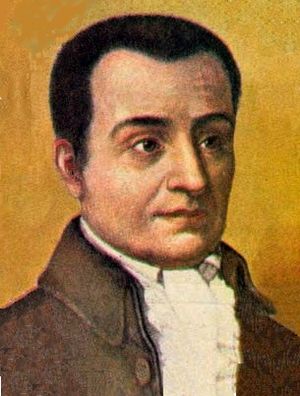Juan Martínez de Rozas facts for kids
Quick facts for kids
Juan Martínez de Rozas
|
|
|---|---|
 |
|
| Interim President of Government Junta | |
| In office February 27, 1811 – April 2, 1811 |
|
| Preceded by | Mateo de Toro Zambrano |
| Succeeded by | Fernando Márquez de la Plata |
| Personal details | |
| Born |
Juan Martínez de Rozas Correa
1759 Mendoza, Captaincy General of Chile, Kingdom of Spain |
| Died | March 3, 1813 (aged 54) Mendoza, United Provinces of the Rio de la Plata |
| Parents | María Correa y Villegas Juan Martínez de Soto y Rozas |
| Alma mater | Royal University of San Felipe |
Juan Martínez de Rozas Correa (born December 28, 1758 – died May 16, 1813) was an important Chilean lawyer and politician. He was a key leader in Chile's fight to become independent from Spain.
Contents
The Early Life of Juan Martínez de Rozas
Juan Martínez de Rozas was born in Mendoza. At that time, Mendoza was part of Chile. His parents were Juan Martínez de Soto Rozas and María Prudencia Correa Villegas.
When he was younger, Juan taught law, theology, and philosophy in Santiago. He also worked as an acting governor in Concepción. Plus, he was a colonel in a local army group called a militia regiment.
Leading Chile's Independence
In 1808, Juan Martínez de Rozas became a secretary for the last Spanish governor, Francisco Antonio García Carrasco. He used this important job to help prepare for a movement to gain independence. This movement started in 1809.
After he left his secretary job, Rozas played a big part in getting the Spanish governor to resign. He also helped create a national group called a Junta on September 18, 1810. He was the true leader of this group. After the first President and Vice President of the First Government Junta passed away, he became the temporary President.
Big Changes and Challenges
Under Juan Martínez de Rozas's leadership, many important changes began. He helped make trade free, which meant people could buy and sell goods more easily. He also helped organize an army for Chile. In July 1811, he called for a national congress to be formed. This was a big step towards self-governance.
However, his influence started to lessen after an event called the Figueroa mutiny. By the end of 1811, disagreements grew between his supporters from Concepción and other leaders in Santiago. He also had a conflict with José Miguel Carrera, who had gained control of Santiago. In 1812, Carrera managed to get Rozas sent away from Santiago. Juan Martínez de Rozas had to go to Mendoza, where he passed away on May 16, 1813.
See also
 In Spanish: Juan Martínez de Rozas para niños
In Spanish: Juan Martínez de Rozas para niños
- Scorpion scandal
- Chilean Independence
- Figueroa mutiny
- Juan Albano Pereira Márquez
 | May Edward Chinn |
 | Rebecca Cole |
 | Alexa Canady |
 | Dorothy Lavinia Brown |

